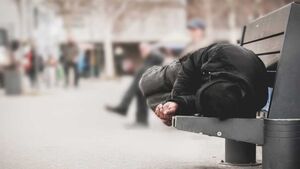About Homelessness
The number of homeless people in London and across the UK has been increasing for more than a decade.

Last year more than 13,000 people slept rough on the streets of our capital.
Many other people are homeless and living in temporary accommodation provided by their local council, such as B&Bs. One in every 51 Londoners is homeless - that's nearly 170,000 people.
The cost of living crisis, along with a significant shortage of affordable housing and insufficient funding for homelessness services, means more people are becoming homeless, but there's less support available. In one of the wealthiest countries in the world, we can and should be doing more to prevent people becoming homeless in the first place, and to better support those who do.
Homelessness can happen to anyone, when something bad happens and you don’t have family or friends around to help.
People sometimes assume that those who end up homeless are somehow at fault, or not doing enough to change their situations. The vast majority don’t choose to be homeless - they're facing a major crisis that means they’ve ended up with nowhere to stay, and no one to turn to.
Many people end up in some form of temporary accommodation, such as hostels or B&Bs, sofa-surfing or squatting. There are hundreds of thousands of people in the UK experiencing insecure, unsafe, overcrowded living situations. There are also many thousands spending their nights on the streets, sleeping rough.
With support, people can leave homelessness behind. There are dozens of organisations throughout London working every day to help people off the streets. However, many of them are underfunded to meet the needs of the many homeless people they see, and reliant on grants such as those from Streets of London. Every project we fund is changing and saving lives.
Homelessness facts
Rough sleeping in London is at a new record high, having increased by more than 10% since last year. The number of people who are street homeless in the capital is more than 5 times what it was in 2005.